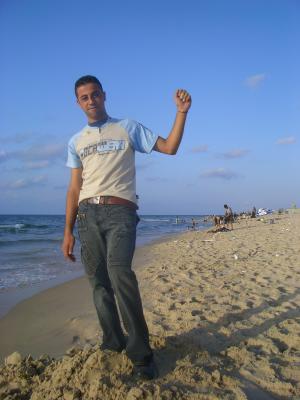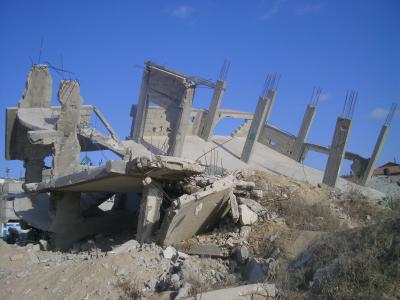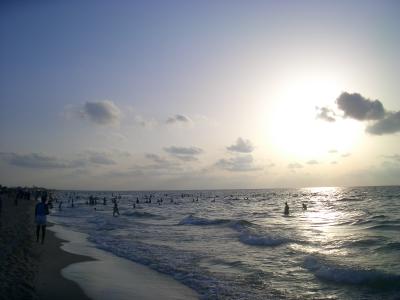Just north of the Egyptian border
 Rafah is as frontline as Palestinian cities get. To the immediate south is the border with Egypt, a border which partitioned Rafah and its population into two cities. Many people in Rafah have relatives - cousins, aunties, brothers, parents - who live on either the Egypitan or Gazan side. For a brief time during the Israeli disengagement last week these relatives could greet each other in person for the first time in over 3 decades. Now the border has been closed by Israel again. The city was partitioned after the 1967 war when previously Egypt-occupied Gaza fell into Israeli hands. As in the photo above, Rafah is crowded with buildings, many peppered with American-made Israeli bullets.
Rafah is as frontline as Palestinian cities get. To the immediate south is the border with Egypt, a border which partitioned Rafah and its population into two cities. Many people in Rafah have relatives - cousins, aunties, brothers, parents - who live on either the Egypitan or Gazan side. For a brief time during the Israeli disengagement last week these relatives could greet each other in person for the first time in over 3 decades. Now the border has been closed by Israel again. The city was partitioned after the 1967 war when previously Egypt-occupied Gaza fell into Israeli hands. As in the photo above, Rafah is crowded with buildings, many peppered with American-made Israeli bullets. Most of the border is straddled by a giant metal wall. The wall was constructed by the Israelis, ostensibly on the grounds of security, thanks to Egypitan steel. Who says Arabs and Jews don't cooperate?
Most of the border is straddled by a giant metal wall. The wall was constructed by the Israelis, ostensibly on the grounds of security, thanks to Egypitan steel. Who says Arabs and Jews don't cooperate? This used to be a tunnel between the Gaza Strip and Egypt. It was used to smuggle a range of goods, from tax free items to guns and illicit drugs.
This used to be a tunnel between the Gaza Strip and Egypt. It was used to smuggle a range of goods, from tax free items to guns and illicit drugs. This is Anees, one of the friendliest, most welcoming people I have ever met. Although he is only 20 he speaks and acts as though he was much older. Obviously he has seen a lot. He spoke at length about the oppressive nature of the Strip. That although the settlements were now gone, and Gazans could travel freely within the Strip (previously three checkpoints within the Strip meant that most could not leave their town or village) life was still difficult.
This is Anees, one of the friendliest, most welcoming people I have ever met. Although he is only 20 he speaks and acts as though he was much older. Obviously he has seen a lot. He spoke at length about the oppressive nature of the Strip. That although the settlements were now gone, and Gazans could travel freely within the Strip (previously three checkpoints within the Strip meant that most could not leave their town or village) life was still difficult. Ruins of houses demolished by the Israelis, usually on the grounds that they harboured militants or were the houses of suicide bombers, are everywhere. The one pictureed above is right next to Anees' house.
Ruins of houses demolished by the Israelis, usually on the grounds that they harboured militants or were the houses of suicide bombers, are everywhere. The one pictureed above is right next to Anees' house."When they [the Israelis] demolish the [neighbouring] house, it damaged our house too. Our house is still broken."
Like so many of the people I've met in Palestine, especially young people, Anees is fed up with the situation. I could not sense any anger, although I had seen and heard of many other angry people. What I felt more deeply was a powerful sense of frustration.
"Do you think I like living like this?" He pointed to another pile of rubble heaped on the street immediately outside the front door to his house. The rubble came from another, adjacent building which had been partially demolished by the Israelis.
"This rubbish has been here for months. No one cleans it up. There is no one to clean it... Just once, I'd like to see some space, no rubbish, just clean and open... Do you think I like living like this?"
I wondered whether such scenes, the daily frustrations of simple routines forever etched into nuisances like piles of rubble and rubbish, ever made him angry, angry towards the Israelis.
"Of course, I am not happy, but I don't hate the Israelis. I don't believe in hate. I would love to meet more Israelis, normal people like me. I just don't know why the [Israeli] army does this to us. Why?"
Don't ask me.
Eventually we arrived at the beach. It was a surprisingly calm place to be given the generally hectic, cramped atmosphere of the rest of Rafah. Yet even here there were signs of the Occupation. In the distance, a lone Israeli navy vessel stood immediately on the horizon. It was a menacing image. If a picture tells a thousand words, then surely this very real image screamed out something even more profound. The Israelis were reminding everyone in Gaza that they were still around. That they were still the ones with all the power, the guns, even the ocean.




0 Comments:
Post a Comment
<< Home